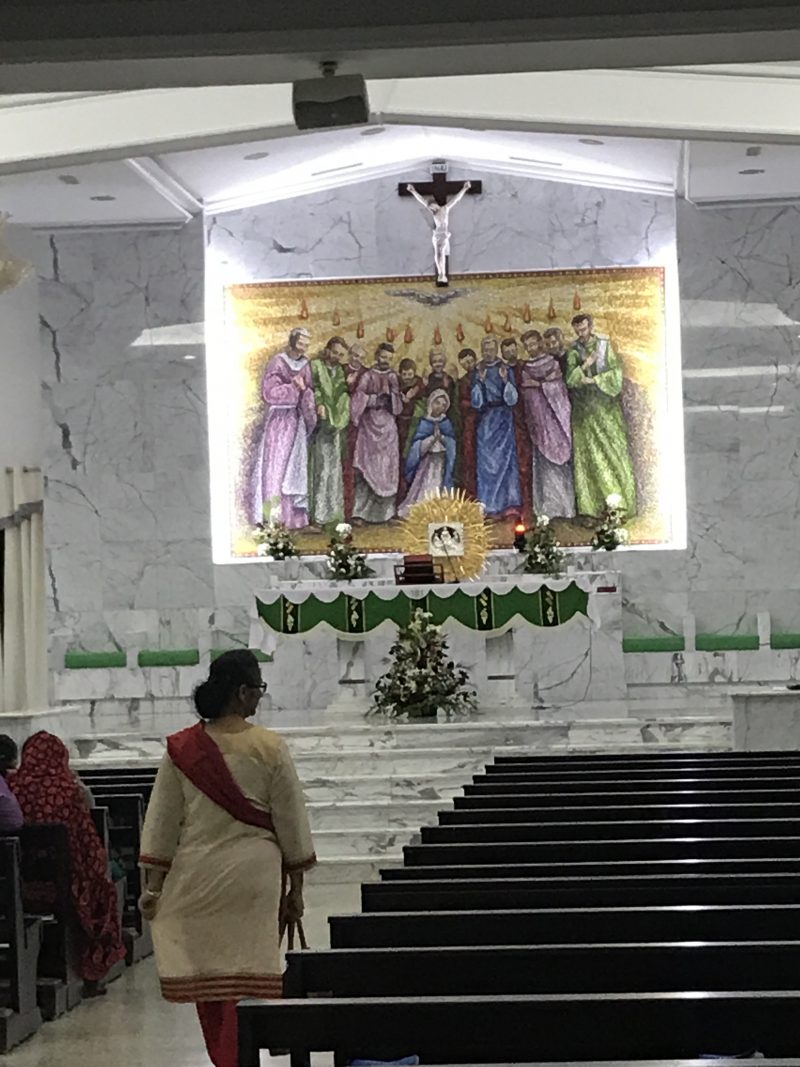RELIGIOUS TOLERANCE IN OMAN
The Sultanate of Oman’s 5,000 year-old history of international contacts and exchanges helped to develop a unique climate of openness and tolerance. Ethnic and religious groups often persecuted elsewhere thus found respect and a home in Oman, where they easily integrated into society.
This unique vision of religious tolerance and peaceful coexistence is today reflected throughout the principles and actions of His Excellency Sheikh Abdallah Bin Mohammed Bin Abdullah Al Salmi, Minister of Awfaq and Religious Affairs since 1997. He constantly strives to strengthen understanding between peoples and to focus on Islam’s peace-loving spirit. The Minister uses his wealth of knowledge to challenge the religious and political stereotypes of the Islamic world and its relationship with the West.
The total population of the Sultanate of Oman was estimated at 3.6 million in 2016, of which up to 55 percent are Omani citizens, the remainder being expatriates. Estimates on religious adherence show Ibadi Muslims form the majority of the population, representing the historically dominant religious group in the country and distinct from Sunni and Shia Islam. Shia Muslims are believed to comprise some 5 per cent of citizens (mainly in the capital area and along the northern coast), while another 5 percent are Hindus and Christians. The remainder of the citizen population are Sunni Muslim.
Religious freedom is an integral part of worship in the Sultanate and this freedom is being strengthened through the actions of the government, encouraging tolerant and inclusive Islamic practices and commonalities with other religions. Respect of the private life and religious convictions of the people is thus a major feature of government action in this field.
A most important role is played by the Ministry of Endowments and Religious Affairs (MERA). All religious organizations must indeed register with the government through this ministry and request meeting and worship space from one of the sponsor organizations recognized by MERA. Individuals who deliver sermons must register too, and licensed imams must follow government-approved sermons. No published rules, regulations or criteria exist for the registration of a new religious group, but MERA reportedly considers the group’s size, theology and availability of other worship opportunities. The same criteria are reportedly used for both Muslim and non-Muslim groups.
The Ministry also continues to publish Al-Tafahom, a quarterly bulletin which exists since more than 10 years and is aimed to broaden dialogue within Islam and to promote respectful discussion with other faiths. The journal publishes scholarly research of the highest standards centered on current issues, with emphasis upon the broad scope of relations among different disciplines, including studies of the West and the dialogue of civilizations.
The Ministry furthermore monitors sermons and distributes approved texts for all imams, to ensure imams do not discuss political topics. Imams are indeed required to preach sermons within politically and social parameters distributed monthly by the government. Religious groups also need to obtain approval from MERA before publishing texts within the country and submit a copy of imported religious materials.
Societal respect for religious freedom is reflected in the Basic Law which declares Islam to be the state religion but prohibits discrimination based on religion and protects the right of individuals to practice religious rites. Non-Muslims groups are thus reported to be able to worship freely in private homes and government-approved houses of worship. Yet, proselytizing in public is illegal and it is a criminal offense to “defame” any faith by spoken or written word. Using the internet in a way that “might prejudice public order or religious values” is also a crime. Yet, the government tolerates public proselytizing within legally registered house of worship and “Islamic propagation centres.”
Although sharia is the basis for legislation, in practice the civil code continues to precede sharia, consistent with the replacement of sharia courts by civil courts in 1999. Judicial outcomes reached under sharia jurisprudence cannot contradict civil statutes, and Shia Muslims may resolve family and personal status cases according to Shia jurisprudence, transferring their cases to civil courts if a solution is not found with the Shia religious tradition. The law also allows non-Muslims to seek adjudication of family or personal status matters under the religious laws of their faith or under civil law.
Islamic studies are mandatory for Muslim students in public schools and non-Muslim students are exempt from this requirement if they do not wish to attend such instruction. The classes take a historical perspective in comparing the evolution of Islamic religious thinking and teachers are prohibited from proselytizing or favoring one Islamic group over another.
Since 10 years, the underlying principles and the outcome of this secular and yet modern approach towards religious freedom in the Sultanate of Oman has been highlighted by reports from various international organizations. A positive view on religious tolerance in the Sultanate is regularly given in the reports by the US State Department, such as the International Religious Freedom Report, a standard reference in this field. Diplomats and specialists also continue to meet Omani government officials to discuss the country’s campaigns to support tolerance and interfaith dialogue across all religious groups, all underlining the importance of a secular experience forming the shape of religious freedom in the future.
Religious diversity, including Muslims, Hindus, Buddhists, Sikhs, Bahais, and Christians (the latter including Roman Catholics, Eastern Orthodox and Protestants), is a major characteristic of the Omani society. Throughout the past centuries, the country has thus been able to create the basis for a truly tolerant society, based upon mutual respect, understanding and continuous dialogue.




